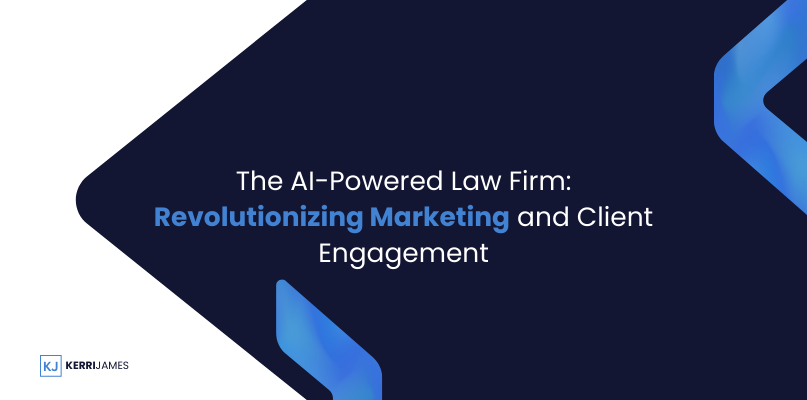The AI-Powered Law Firm: Revolutionizing Marketing and Client Engagement
The legal profession, often perceived as traditional and resistant to change, is on the cusp of a technological revolution. Artificial intelligence (AI), once relegated to the realm of science fiction, is now a tangible and transformative force reshaping the legal landscape, particularly in the critical areas of law firm marketing and client engagement.
Gone are the days of relying solely on word-of-mouth referrals, static websites, and cumbersome manual processes. In today’s digital age, law firms must embrace innovative strategies and leverage cutting-edge technologies to stand out in an increasingly competitive market. This is where AI steps in, offering unprecedented opportunities to streamline operations, enhance client experiences, drive business growth, and ultimately redefine what it means to be a successful law firm in the 21st century.
This article delves into the transformative potential of AI in law firm marketing, focusing on four key areas that are ripe for AI-driven disruption: content generation, relationship management, note-taking, and transcript generation. By understanding and harnessing the power of these AI-powered solutions, law firms can not only optimize their existing marketing efforts but also unlock entirely new avenues for growth and client engagement.
Content Generation: Engaging Your Audience with AI
In today’s digital landscape, content is king. Creating high-quality, relevant, and consistent content is paramount to attracting and engaging potential clients, establishing thought leadership, and building a strong brand identity. However, for busy legal professionals juggling demanding caseloads and client demands, finding the time and resources for content creation can feel like an insurmountable challenge.
This is where AI-powered content generation tools offer a game-changing solution. By automating and streamlining the content creation process, AI empowers lawyers to focus on their core expertise – providing exceptional legal counsel – while ensuring a steady stream of engaging and informative content that resonates with their target audience.
Here’s how AI is transforming content creation for law firms:
Blog Post and Article Generation: AI-powered writing assistants, trained on vast datasets of legal texts, can generate informative and engaging blog posts and articles on a wide variety of legal topics. By simply inputting keywords, desired tone, target audience, and specific legal areas of focus, lawyers can receive well-structured, grammatically sound, and insightful drafts that require minimal editing. This allows firms to maintain an active blog presence, establish themselves as thought leaders in specific practice areas, and provide valuable legal information to potential clients, attracting organic traffic and building trust with potential clients.
Social Media Content: In today’s hyper-connected world, maintaining an active and engaging social media presence is no longer optional – it’s essential. AI tools can analyze trending legal topics, identify relevant hashtags, generate engaging captions and visuals (even suggesting relevant legal imagery), and even schedule posts across various platforms like LinkedIn, Twitter, and Facebook. This ensures a consistent and impactful online presence, allowing law firms to connect with a wider audience, build brand awareness, and attract new clients. Imagine AI generating social media posts highlighting recent case wins, new legislation relevant to your practice areas, or even sharing insightful quotes from partners at your firm, all while ensuring your brand voice and messaging remain consistent.
Website Content Optimization: A law firm’s website is often the first point of contact for potential clients. AI algorithms can analyze website traffic data, user behavior patterns, and search engine rankings to recommend data-driven content improvements. From keyword optimization and content relevance analysis to identifying emerging legal topics and competitor strategies, AI helps ensure that a law firm’s website ranks higher in search engine results, attracts more organic traffic, and converts visitors into qualified leads. This could involve optimizing attorney bios for relevant keywords, identifying new long-tail keywords to target in blog content based on user search queries, or even suggesting relevant calls to action to encourage website visitors to schedule consultations.
Legal Updates and Newsletters: Keeping clients informed about changes in the law, recent case rulings, and relevant legal developments is not just good practice – it’s essential for building trust, demonstrating expertise, and nurturing long-term client relationships. AI can automate the process of generating personalized newsletters and legal updates tailored to specific client industries and practice areas, ensuring that clients receive timely, relevant, and valuable information directly to their inbox. This could involve sending automated updates when new legislation impacting a client’s industry is passed, generating summaries of relevant court decisions, or even creating personalized newsletters based on a client’s specific legal needs and interests.
E-books and White Papers for Lead Generation: AI can assist in creating high-value content pieces like e-books and white papers that provide in-depth analysis of complex legal issues relevant to your target audience. These can be used as lead magnets on your website, offered in exchange for contact information, allowing you to build your email list and nurture leads with targeted content.
Benefits for Law Firms:
Increased Efficiency and Productivity: Automating content creation frees up valuable time for lawyers, allowing them to focus on client work, case preparation, and other high-value tasks that require their legal expertise.
Enhanced Content Quality and Consistency: AI tools ensure grammatical accuracy, clarity, consistency in style and tone, and adherence to brand guidelines across all content formats, projecting a professional and trustworthy image for the firm.
Improved SEO Performance and Online Visibility: By optimizing content for search engines, AI helps attract more organic traffic to the firm’s website, increasing online visibility, generating leads, and positioning the firm as a go-to resource in its practice areas.
Strengthened Brand Identity and Thought Leadership: Consistently publishing high-quality content that provides valuable insights and analysis helps establish the firm as a thought leader in its field, enhancing its reputation and attracting clients seeking specialized expertise.
Relationship Management: Nurturing Connections with AI
In the legal profession, relationships are paramount. Building and maintaining strong client relationships based on trust, communication, and personalized attention is at the heart of a successful and sustainable law practice. While technology should never replace the human touch, AI can play a pivotal role in enhancing client communication, streamlining intake processes, and fostering deeper, more meaningful client relationships that stand the test of time.
AI-powered tools are transforming client relationship management in the following ways:
Automated Appointment Scheduling and Intake: AI-powered chatbots and virtual assistants, available 24/7 on the firm’s website or through messaging platforms, can handle routine inquiries, schedule appointments with lawyers based on availability, answer basic legal questions, pre-screen potential clients, and collect essential information for intake forms. This streamlines the client intake process, reduces administrative burden on staff, and ensures that potential clients receive prompt and efficient service, making a positive first impression and demonstrating your firm’s commitment to client service.
Personalized Communication and Client Segmentation: AI can analyze vast amounts of client data, including communication history, case details, practice area interests, website browsing behavior, and even social media activity, to create detailed client profiles and segment clients into meaningful groups. This allows lawyers to tailor their communication, marketing materials, and service offerings to individual client needs, preferences, and communication styles, fostering stronger relationships and increasing client lifetime value. Imagine AI helping you craft personalized email campaigns for clients in different industries, each highlighting legal developments and case studies relevant to their specific business, or suggesting tailored follow-up messages based on a client’s communication preferences and past interactions.
Client Feedback Analysis and Sentiment Monitoring: Understanding client feedback is crucial for improving service delivery and client satisfaction. AI can analyze client feedback from a variety of sources, including surveys, online reviews, emails, and even social media interactions, to identify trends, patterns, and areas for improvement. Sentiment analysis tools can even gauge client sentiment and alert lawyers to potential issues before they escalate, allowing for proactive problem-solving and client retention strategies. This could involve identifying common pain points in client feedback, tracking sentiment over time to identify potential issues early on, or even analyzing social media mentions to gauge public perception and address any negative feedback promptly.
Predictive Analytics for Client Retention: Losing a client is not only detrimental to revenue but also represents a missed opportunity to build a long-term relationship. By analyzing historical client data, communication patterns, case outcomes, and even billing history, AI can identify clients at risk of leaving the firm due to dissatisfaction, lack of communication, or competitive offers. This allows lawyers to proactively address concerns, provide personalized attention, offer tailored solutions, and implement strategies to retain valuable clients and prevent client churn.
Benefits for Law Firms:
Enhanced Client Experience and Accessibility: AI-powered tools streamline communication, automate routine tasks, and provide 24/7 access to information, making it easier than ever for clients to connect with the firm, schedule appointments, and access the resources they need, when they need them. This enhanced accessibility and responsiveness contributes to a positive client experience and sets the foundation for a strong and lasting relationship.
Increased Client Satisfaction and Loyalty: Personalized communication, proactive problem-solving, and a genuine effort to understand and address client needs contribute to higher levels of client satisfaction, fostering loyalty and positive word-of-mouth referrals.
Improved Client Retention Rates and Reduced Churn: By identifying and addressing potential issues early on, implementing data-driven retention strategies, and nurturing long-term relationships, AI helps law firms reduce client churn and build a stable and profitable client base.
Note-Taking: Capturing Crucial Details with AI
Accurate, detailed, and organized note-taking is not just a good habit – it’s an absolute necessity in the legal profession. Whether it’s capturing crucial details during client meetings, documenting key takeaways from depositions, or creating a comprehensive record of court proceedings, lawyers rely on their notes to recall information, prepare legal arguments, and build compelling cases. However, traditional note-taking methods can be time-consuming, prone to human error, and difficult to organize and search effectively.
AI-powered note-taking tools offer a more efficient, reliable, and intelligent alternative, ensuring that no crucial information is missed and that lawyers have the information they need at their fingertips.
Here’s how AI is enhancing note-taking for lawyers:
Speech-to-Text Transcription in Real-Time: AI-powered software can transcribe audio recordings of client meetings, depositions, and court proceedings in real-time, providing accurate and searchable text documents that lawyers can refer back to at any time. This eliminates the need for manual note-taking, reduces the risk of errors, and allows lawyers to focus their full attention on the conversation at hand, picking up on subtle cues and nuances that might be missed while frantically scribbling notes.
Keyword and Topic Identification for Legal Context: AI algorithms, trained on legal terminology and concepts, can analyze transcribed text to identify key legal concepts, case citations, relevant statutes, names of parties involved, important dates, and other crucial details. This allows lawyers to quickly and easily extract relevant information from lengthy recordings, organize notes by topic or legal issue, and prepare for upcoming proceedings more efficiently. Imagine having AI automatically tag sections of a deposition transcript with relevant legal issues, case citations, or names of key witnesses, making it incredibly easy to navigate the document and quickly locate the information you need.
Automated Summarization for Efficient Review: Lawyers often need to review hours of recorded conversations or pages of legal documents. AI can generate concise and accurate summaries of lengthy meetings or documents, highlighting the most important points, identifying key legal arguments, and summarizing witness testimonies. This saves lawyers valuable time and allows them to quickly grasp the essence of lengthy recordings without having to listen to or read through every single word.
Organization, Tagging, and Search Functionality for Easy Access: AI-powered note-taking platforms offer robust organization and search capabilities. Lawyers can easily tag notes with keywords, case names, client names, or any other relevant categories. This makes it incredibly easy to search through vast amounts of notes to quickly locate specific information, prepare for depositions or court appearances, and ensure that they have all the relevant details at their disposal.
Benefits for Law Firms:
Improved Accuracy, Completeness, and Reliability: AI-powered transcription eliminates the risk of human error, captures every word spoken with a high degree of accuracy, and ensures that lawyers have a complete and reliable record of all conversations, testimonies, and legal arguments.
Enhanced Organization and Accessibility of Information: AI tools transform the way lawyers manage and access their notes, ensuring that information is easily searchable, well-organized, and readily accessible when needed. This saves time, reduces stress, and ensures that lawyers are always prepared.
Increased Focus on Client Interaction and Strategic Thinking: By automating the note-taking process, lawyers can fully engage with their clients during meetings, focus on active listening, and devote their mental energy to strategic thinking and legal analysis rather than trying to jot down every word.
Transcript Generation: From Audio to Text with AI
Transcripts play a vital role in legal proceedings, providing an accurate, verbatim record of conversations, testimonies, interviews, and legal arguments. They are used for a multitude of purposes, including preparing for depositions and trials, refreshing witness memories, identifying key evidence, and supporting legal briefs and motions. Traditionally, transcript generation has been a time-consuming, expensive, and often inaccurate process, relying on human transcribers who may mishear or misinterpret words.
AI-powered transcription services are revolutionizing this process, offering unprecedented speed, accuracy, affordability, and scalability, allowing legal teams to access high-quality transcripts faster and more cost-effectively than ever before.
How AI is transforming transcript generation:
Accurate Transcription with Advanced Speech Recognition: AI-powered transcription services leverage sophisticated speech recognition algorithms, trained on vast datasets of spoken language and legal terminology, to convert audio and video recordings into text with a remarkable degree of accuracy. These algorithms are constantly learning and improving, and many services boast accuracy rates of 99% or higher for clear recordings. Even for recordings with background noise, multiple speakers, or strong accents, AI transcription services often outperform human transcribers in terms of speed and accuracy, and they continue to improve over time as they are exposed to more data.
Speaker Identification and Diarization: AI can not only transcribe words but can also differentiate between multiple speakers in a recording, even in cases of overlapping speech or background noise. This process, known as speaker diarization, ensures that each utterance is correctly attributed to the correct speaker in the transcript, improving clarity and readability. This is particularly crucial in legal settings where accurately attributing statements to the correct individual is paramount.
Timestamping for Easy Navigation and Reference: AI-powered transcription tools automatically insert timestamps at regular intervals throughout the transcript, making it easy to locate specific moments within the recording, quickly navigate to key passages, and cite specific moments in legal documents or arguments. This eliminates the need for manual time-coding and saves countless hours when reviewing lengthy recordings.
Multiple Language Support for Global Cases: The legal profession is becoming increasingly globalized, and lawyers often work with clients and colleagues from all over the world. AI transcription services are keeping pace with this trend by offering support for multiple languages, allowing lawyers to order transcripts in different languages and ensuring accurate communication across language barriers.
Benefits for Law Firms:
Time and Cost Savings: AI transcription services are significantly faster and more affordable than traditional human transcribers. This frees up administrative staff and allows legal professionals to focus on higher-value tasks, ultimately increasing efficiency and reducing overhead costs.
Increased Accuracy: AI algorithms minimize the risk of human error, ensuring that transcripts are highly accurate, reliable, and admissible in legal proceedings. This is particularly important in cases where even a slight inaccuracy in a transcript could have significant consequences.
Faster Turnaround Times: AI-powered services can deliver transcripts within hours or even minutes, allowing legal teams to review information and prepare their cases more efficiently. This speed is crucial in fast-paced legal environments where timely access to information can make all the difference in building a strong case.
The Future of AI in Law Firm Marketing
The use of AI in law firm marketing is still in its early stages, but its potential is vast. As AI technology continues to evolve, we can expect to see even more innovative applications emerge, further transforming the legal landscape and blurring the lines between human expertise and artificial intelligence.
Here are some potential future developments:
Predictive Analytics for Marketing Campaigns: AI algorithms will become even more sophisticated in analyzing data to predict the success of marketing campaigns, allowing law firms to optimize their strategies for maximum ROI. Imagine AI identifying the most effective marketing channels for specific practice areas, predicting which potential clients are most likely to convert based on their online behavior, or even suggesting optimal budgets and ad spend allocation for different campaigns.
Hyper-Personalized Client Experiences: AI will enable law firms to deliver highly personalized experiences to each client, tailoring content, communication, and service offerings based on individual needs and preferences. This could involve creating personalized client portals that provide on-demand access to case documents, legal updates tailored to their industry, and even AI-powered chatbots that can answer basic legal questions and schedule appointments.
Automated Legal Research and Analysis: AI-powered tools will increasingly assist lawyers with legal research, contract analysis, and case law review, freeing up their time to focus on strategic decision-making and client interaction. Imagine AI tools that can instantly analyze thousands of legal documents to identify relevant precedents, highlight potential risks in contracts, or even predict the outcome of cases based on historical data and case law analysis.
Embrace the AI Advantage; Pair it with Human Touch
The integration of AI into law firm marketing and client engagement is no longer a futuristic vision but a present-day reality. The legal profession is on the cusp of a technological revolution, and those who embrace these advancements will be best positioned to thrive in the years to come. By leveraging AI-powered tools to automate tasks, enhance efficiency, improve client experiences, and gain data-driven insights, law firms can optimize their operations, attract and retain clients, and solidify their position as leaders in the ever-evolving legal landscape.
The key is to approach AI implementation strategically, selecting tools that align with specific business goals, integrating them seamlessly into existing workflows, and prioritizing a client-centric approach. By doing so, law firms can harness the power of AI not to replace human expertise but to augment it, freeing up lawyers to focus on what they do best: providing exceptional legal counsel, building lasting client relationships, and upholding the integrity of the legal profession. As AI continues to evolve, the possibilities for innovation in the legal field are limitless, and the firms that embrace these advancements will be the ones that shape the future of law.










